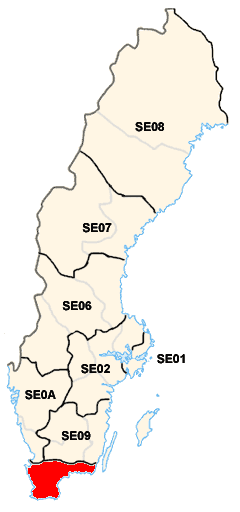Top Qs
Timeline
Chat
Perspective
South Sweden
National area in Sweden From Wikipedia, the free encyclopedia
Remove ads
South Sweden (Swedish: Sydsverige) is a subdivision of Sweden as defined by the Nomenclature of Territorial Units for Statistics (NUTS). It is classified as a NUTS-1 statistical region of Sweden. It encompasses an area of 13,968 km2 (5,393 sq mi), and is the second smallest sub-division in Sweden. It incorporates two counties–Blekinge and Skåne.
Remove ads
Sub-division
The country of Sweden is organized into eight national areas, which are the primary sub-divisions of the country.[4] These are further divided into 21 regions.[5][6] For statistical purposes, the Nomenclature of Territorial Units for Statistics (NUTS) organizes the country into three broader level sub-divisions based on cardinal directions. These are classified as a NUTS-1 statistical regions of Sweden, and incorporate various regions within it.[7][8][9] South Sweden incorporates two counties–Blekinge and Skåne.[8]
Remove ads
Geography
South Sweden covers southern most land area of the country. It is situated close to Denmark and borders the Småland and the islands and West Sweden.[10][11] The region encompasses an area of 13,968 km2 (5,393 sq mi), and is the second smallest non-national sub-division in Sweden.[1] It had a population of over 1.5 million in 2024.[2] Majority of the region consists of plain lands. The region has a temperate climate and the climate becomes relatively warmer moving towards the south despite its location close to the arctic circle due to the effect of North Atlantic Current.[12]
Remove ads
Economy
The Gross domestic product (GDP) of the region was 68.460 billion euros in 2021, and accounted for 12.6% of Swedish economic output.[13] GDP per capita adjusted for purchasing power was 31,100 € or 103% of the European union average in the same year. The GDP per employee was also 103% of the EU average.[14]
See also
References
External links
Wikiwand - on
Seamless Wikipedia browsing. On steroids.
Remove ads

